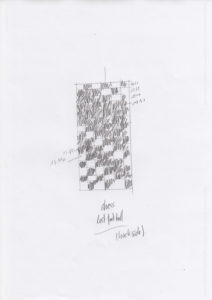Prix AWARE
When I announced to Eva Barto1 that I had to write a note on her work, she begged me not to launch into a description of it. “Anyway, I bet you won’t be able to!” she added, laughing. Miffed at first, I soon realised however that she was right.
Despite our past discussions and my interest in her work, it was impossible for me to precisely describe the elements that make up this corpus. A certain number of works came to mind but the ensemble (pervaded with figures of the forger and the big-time gambler, by tactics of avoidance, debt, fraud, or bids, by fictional economic models of instrumentalisation, like dummy corporations…) escaped ekphrasis – a notion from the rhetorical manuals of ancient Greece and Rome that refers to any abiding evocation of a given subject, by enabling it to suddenly appear before the eyes of its intended beholder. Over the course of my discussion with Eva Barto, I understood that the problematic involved in this reticence concerned the integrity of her work, as though its relative opacity was part and parcel with preventive conservation standards, like rates of hygrometry, temperature, or the amount of lumens. For many artists, any form of dissemination is welcome, since it contributes to the means required for the conditions of existence of an artistic career. For Eva Barto, it seems on the contrary that an excess of poorly controlled visibility might prejudice her works – corrode them, somehow, like rust on metal. There are no photos in the artist’s portfolio. Very few artworks are indexed in Google Images. Eva Barto’s strategies resist description. As the instigators of a representational crisis, the artworks she produces are the blocking instruments that short-circuit the pathways of production, distribution, and exchange that fuel the systems of accumulation of capital.
Gallien Déjean
Eva Barto was born in the west in the 1980s. Like many others, she decided to move to Paris. After high school, she enrolled at the Sorbonne. She had a stint at the Beaux-Arts de Paris followed by a postgraduate diploma in Lyon. Her work has been presented in several solo and collective exhibitions in France and abroad. With another artist, she is currently preparing an exhibition for 2019 at a Kunstverein in Germany. On several occasions, she has exhibited in galleries but refuses to join the official list of producers whose work is represented and sold by this kind of organisation. In 2016, she founded an entity that she presents, depending on her interlocutor, as a real or fake publishing house. She also coordinates a working group for discussing and acting on emancipation and value-enhancement issues for workers within the art world.
Gallien Déjean is an art critic and independent curator. He teaches art history and theory at the École cantonale d’art de Lausanne (ECAL) and at the École nationale supérieure d’arts in Paris-Cergy (ENSAPC). He is a member of Treize, a Parisian production, exhibition, and publishing company. He recently curated the first retrospective devoted to the English art collective BANK (Self Portrait - BANK’s Archives & Relics - 1991-2003 at Treize in 2012 and Elaine MGK, in Basel, in 2013). From 2013 to 2015, he curated several exhibitions at the Palais de Tokyo. In 2018, at the Plateau à Paris, he organised the collective exhibit A Study in Scarlet around the work of Cosey Fanni Tutti. He has published several books as an author and editor. He is currently at work on a catalogue about BANK, which will be published by Primary Information, NY (The Bank Fax-Bak Service).
Translated from French by Anna Knight.
Tous droits réservés dans tous pays/All rights reserved for all countries.






